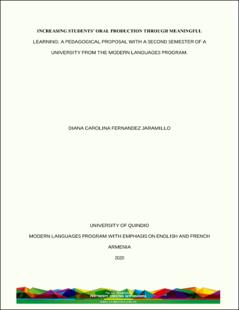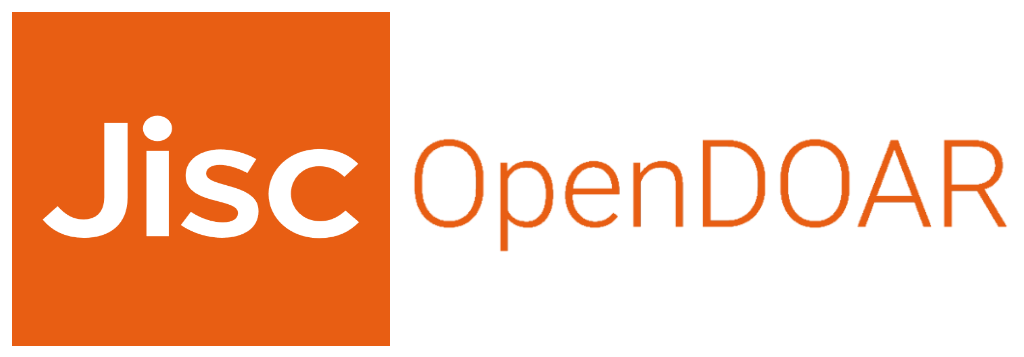Mostrar el registro sencillo del ítem
Increasing students’ oral production through meaningful learning: a pedagogical proposal with a second semester of a university from the modern languages program.
| dc.contributor.advisor | Ortiz, Paola | |
| dc.contributor.author | Fernández Jaramillo, Diana Carolina | |
| dc.date.accessioned | 2023-02-06T20:59:57Z | |
| dc.date.available | 2023-02-06T20:59:57Z | |
| dc.date.issued | 2020-06-06 | |
| dc.identifier.uri | https://bdigital.uniquindio.edu.co/handle/001/6303 | |
| dc.description.abstract | This research focuses on the development of oral production through meaningful learning, which is based on authors like Ausubel, Novak, and Hanesian (1978) who designed the "theory of meaningful learning", the first systematic model of cognitive learning. First of all, meaningful learning can be defined as the connection between new information to previous knowledge, that is to say, the lived experiences that the student relates to the new concepts to facilitate their understanding and application. Such is the case of Fink (2013) who developed a meaningful learning taxonomy that offers teachers specific learning objectives that go beyond comprehension. In the practice of teaching, significant learning manifests different ways taking into account the context of the student and the experiences that each learner relates to in their learning process. For this reason, it is essential to use methods applicable to oral production of students because there are cases in which they show a poor oral fluency in classroom activities, such as simple communication exercises between classmates. In fact, strengthening the oral ability it is considered as one of the most important communicative skills since students need to produce the target language, and more if they can do it by listening to each other, without neglecting reading, writing, and listening during the acquisition process. | spa |
| dc.description.tableofcontents | Introduction | eng |
| dc.description.tableofcontents | Problem Statement | eng |
| dc.description.tableofcontents | Justification | eng |
| dc.format.extent | 105 páginas | spa |
| dc.format.mimetype | application/pdf | spa |
| dc.language.iso | eng | spa |
| dc.rights | Derechos reservados Universidad del Quindío | spa |
| dc.rights.uri | https://creativecommons.org/licenses/by-nc-nd/4.0/ | spa |
| dc.title | Increasing students’ oral production through meaningful learning: a pedagogical proposal with a second semester of a university from the modern languages program. | eng |
| dc.type | Trabajo de grado - Pregrado | spa |
| dc.rights.accessrights | info:eu-repo/semantics/openAccess | spa |
| dc.rights.creativecommons | Atribución-NoComercial-SinDerivadas 4.0 Internacional (CC BY-NC-ND 4.0) | spa |
| dc.type.coar | http://purl.org/coar/resource_type/c_7a1f | spa |
| dc.type.driver | info:eu-repo/semantics/bachelorThesis | spa |
| dc.type.version | info:eu-repo/semantics/publishedVersion | spa |
| dc.relation.references | Al- Eiadeh1, Al.Sobh, Al-Zoubi and Al-Khasawneh. (2016) Improving English Language Speaking Skills of Ajloun National University Students. International Journal of English and Education. [Ebook]. Retrieved from: https://www.researchgate.net/publication/306079718_Improving_English_Language_Spea king_Skills_of_Ajloun_National_University_Students | spa |
| dc.relation.references | Deslauriers. (2004). Investigación cualitativa: guía práctica. El Repositorio Institucional: Universidad Tecnológica de Pereira. Retrieved from: http://bit.ly/3cHb93u | spa |
| dc.relation.references | López, Quintero and Machado. (2007). La ética en la investigación. Universidad Rafael Belloso Chacín. [Ebook]. | spa |
| dc.description.degreelevel | Pregrado | spa |
| dc.description.degreename | Licenciado en Lenguas Modernas | spa |
| dc.publisher.faculty | Facultad de Ciencias de la Educación | spa |
| dc.publisher.place | Armenia, Quindío | spa |
| dc.publisher.program | Educación - Licenciatura en Lenguas Modernas | spa |
| dc.type.content | Text | spa |
| dc.type.redcol | https://purl.org/redcol/resource_type/TP | spa |
| dc.type.coarversion | http://purl.org/coar/version/c_fa2ee174bc00049f | spa |
| dc.rights.coar | http://purl.org/coar/access_right/c_abf2 | spa |














